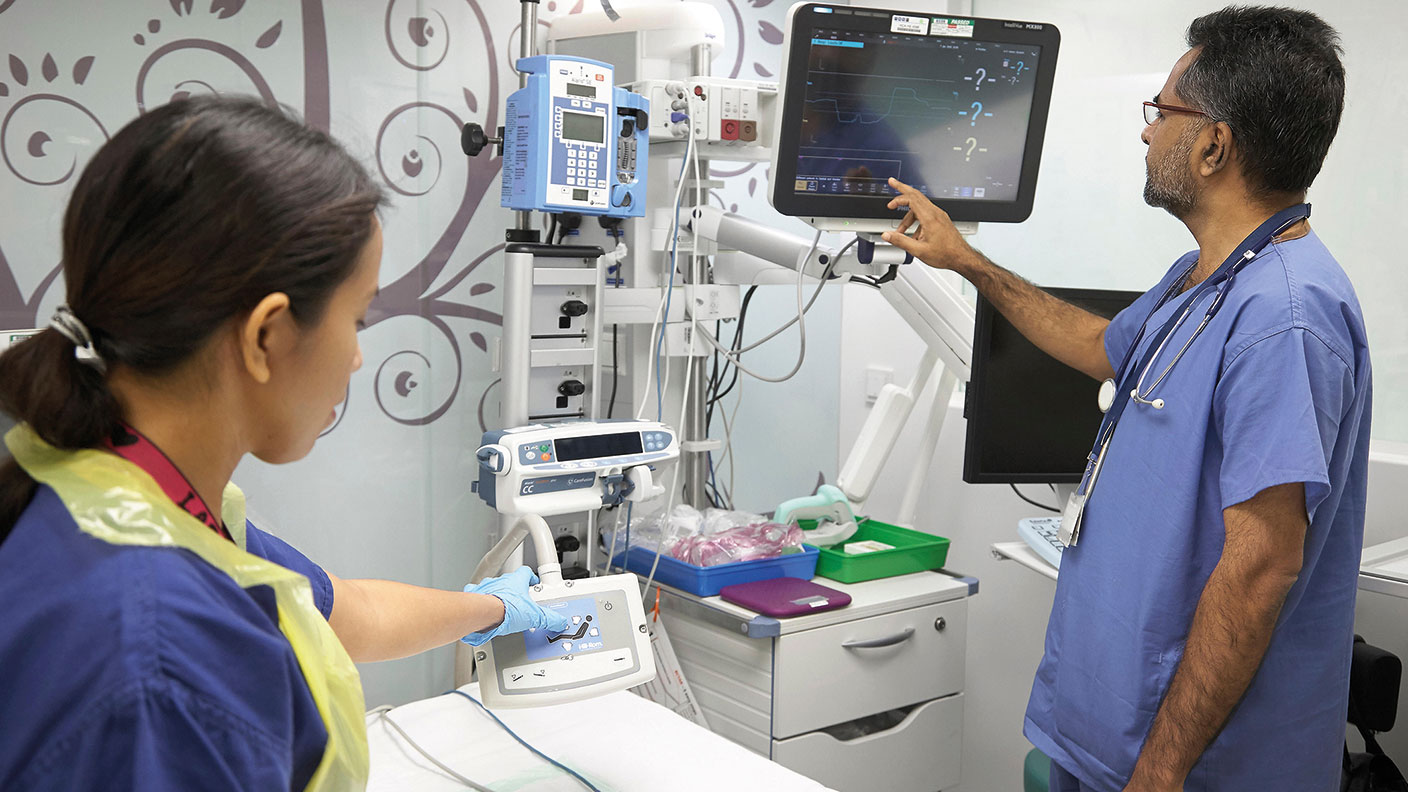
Get the latest financial news, insights and expert analysis from our award-winning MoneyWeek team, to help you understand what really matters when it comes to your finances.
You are now subscribed
Your newsletter sign-up was successful
Want to add more newsletters?
The remarkable speed at which scientists were able to discover new vaccines and treatments during the pandemic and roll out mass usage seemed to show that there is no medical affliction which is beyond the scope of ingenuity and innovation. This seemed likely to usher in a new golden era for the healthcare sector, and for biotechnology in particular, that would boost the private companies at the forefront of the medical revolution.
Instead the biotech sector is in its biggest bear market in 30 years. In 12 months, the S&P Biotechnology index has lagged the S&P 500 by 64%, falling nearly 50% back to the level of mid 2015. The broader healthcare sector has fared better, thanks to the resilient share prices of big pharmaceutical firms and healthcare service providers. But smaller, innovative companies focusing on research and development rather than shortterm cash flow have suffered.
Time for the tide to turn
In the year to 28 February, the net asset value of Worldwide Healthcare Trust (LSE: WWH) was down 9%, and that of its sister trust Biotech Growth Trust (LSE: BIOG) was down 35%, each 22% behind their benchmark indices. “Fundamentals did not matter,” says Sven Borho, co-manager of WWH. “Everything was driven by macro trends such as growth into value”. In addition to the poor performance of biotech (22% of WWH’s portfolio, 82% of BIOG’s), exposure to the massive under-performance of Chinese companies (8% in both), also hurt the trusts, he notes.
Try 6 free issues of MoneyWeek today
Get unparalleled financial insight, analysis and expert opinion you can profit from.

Sign up to Money Morning
Don't miss the latest investment and personal finances news, market analysis, plus money-saving tips with our free twice-daily newsletter
Don't miss the latest investment and personal finances news, market analysis, plus money-saving tips with our free twice-daily newsletter
Still, “the healthcare sector now trades on a 20% discount to the S&P 500, the same as in the financial crisis”, says Borho. “Every single time it has traded at such a discount has been the very best time to be invested, especially in innovation and growth.” Meanwhile, the threat of drug pricing reform and regulatory change in the US has lifted. “We are very confident of recapturing much of the lost performance of WWH and BIOG… We have bounced back from setbacks before.”
Controlling the costs
By far the best performer in the sector is the £1bn BB Healthcare trust (LSE: BBH), which is up by 84%, over the past five years. Manager Paul Major has focused on the rising cost of healthcare – which accounted for 10% of US GDP in 1980 but is now 18% – as a key theme. “The compound annual real growth rate of NHS expenditure is 2.25% but needs to be 3.5%.
Thanks to ageing populations, scientific progress and increasing wealth, healthcare is the secular growth story of our age but it needs to be paid for.” BBH invests in firms that “provide innovative solutions for broken healthcare systems around the world”. For example, healthcare waste in the US is estimated at $750bn per annum.
“The political discussion in the US is about prescription drugs but they only account for 10% of total spending. Hospital care accounts for 31% and physicians and clinics 20%.” This is where efficiency can improve, says Major. “Hospitals are expensive and nobody wants to be there, so newer care models are needed. The first interaction of patients with healthcare needs to be online.”
Other areas of focus are diagnostics, patient monitoring, disease prevention and changing behaviour. “People do not follow medical advice or behave rationally so they need to be nudged. For example, 15% of those with cancer in the US are not receiving treatment. Sensory technology can be used for monitoring the treatment of patients so that their arrival in hospital represents a last resort.”
Other areas of focus are diagnostics, patient monitoring, disease prevention and changing behaviour. “People do not follow medical advice or behave rationally so they need to be nudged. For example, 15% of those with cancer in the US are not receiving treatment. Sensory technology can be used for monitoring the treatment of patients so that their arrival in hospital represents a last resort.”
Get the latest financial news, insights and expert analysis from our award-winning MoneyWeek team, to help you understand what really matters when it comes to your finances.

Max has an Economics degree from the University of Cambridge and is a chartered accountant. He worked at Investec Asset Management for 12 years, managing multi-asset funds investing in internally and externally managed funds, including investment trusts. This included a fund of investment trusts which grew to £120m+. Max has managed ten investment trusts (winning many awards) and sat on the boards of three trusts – two directorships are still active.
After 39 years in financial services, including 30 as a professional fund manager, Max took semi-retirement in 2017. Max has been a MoneyWeek columnist since 2016 writing about investment funds and more generally on markets online, plus occasional opinion pieces. He also writes for the Investment Trust Handbook each year and has contributed to The Daily Telegraph and other publications. See here for details of current investments held by Max.
-
 Do you face ‘double whammy’ inheritance tax blow? How to lessen the impact
Do you face ‘double whammy’ inheritance tax blow? How to lessen the impactFrozen tax thresholds and pensions falling within the scope of inheritance tax will drag thousands more estates into losing their residence nil-rate band, analysis suggests
-
 Has the market misjudged Relx?
Has the market misjudged Relx?Relx shares fell on fears that AI was about to eat its lunch, but the firm remains well placed to thrive
-
 Fund inflows hit a six-month high in November – where are investors putting their money?
Fund inflows hit a six-month high in November – where are investors putting their money?Investors returned to the financial markets amid the Autumn Budget in November 2025 but caution remains.
-
 The top stocks of 2025 - did you pick a winner?
The top stocks of 2025 - did you pick a winner?Last year was a chaotic one for the stock market, but which stocks did investors buy the most of?
-
 Canada will be a winner in this new era of deglobalisation and populism
Canada will be a winner in this new era of deglobalisation and populismGreg Eckel, portfolio manager at Canadian General Investments, selects three Canadian stocks
-
 What's behind the big shift in Japanese government bonds?
What's behind the big shift in Japanese government bonds?Rising long-term Japanese government bond yields point to growing nervousness about the future – and not just inflation
-
 Best-performing stocks in the S&P 500
Best-performing stocks in the S&P 500We take a look at the best-performing stocks in the US equity market. Are there opportunities outside of Big Tech?
-
 What is Vix – the fear index?
What is Vix – the fear index?What is Vix? We explain how the fear index could guide your investment decisions.
-
 The case for dividend growth stocks
The case for dividend growth stocksMany investors focus on yield alone when looking for income, that’s a mistake says Rupert Hargreaves. It’s the potential for dividend growth that really matters.
-
 Halifax: House price slump continues as prices slide for the sixth consecutive month
Halifax: House price slump continues as prices slide for the sixth consecutive monthUK house prices fell again in September as buyers returned, but the slowdown was not as fast as anticipated, latest Halifax data shows. Where are house prices falling the most?
